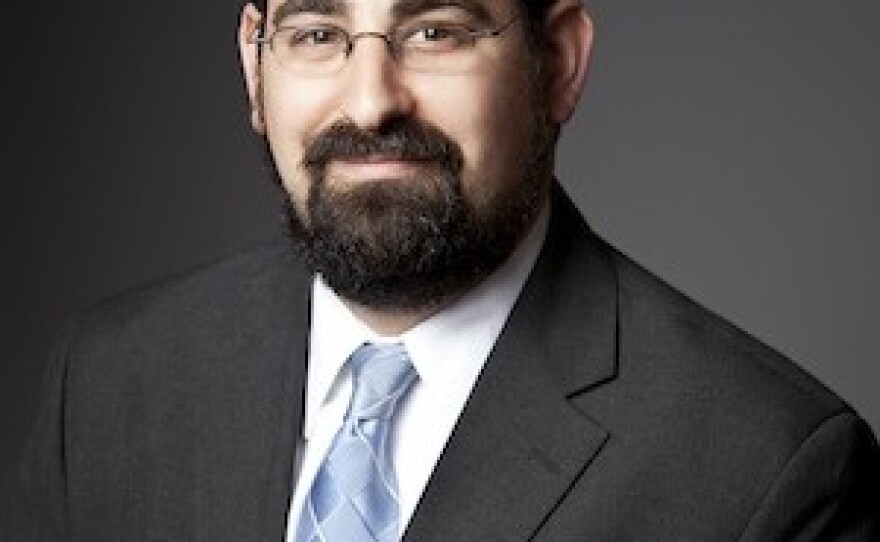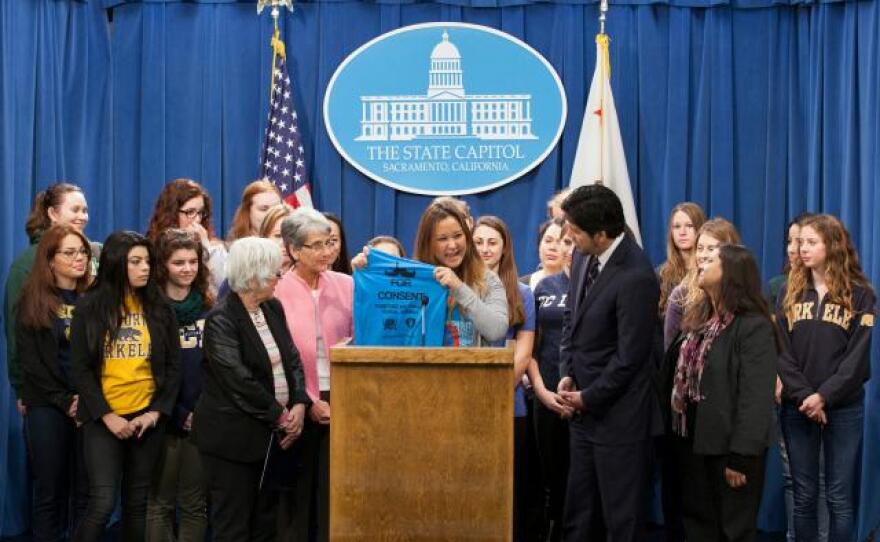Three years ago, Aryle Butler was a freshman at University of California Berkeley when she won a coveted position. She would be a summer research assistant on a Berkeley project in another state.
The school year ended and Butler, who grew up in East Los Angeles, got on a plane to head to the research site.
“It was the first time I’d ever flown anywhere,” she said. “It was the first time I’d been out of the state of California.”
Butler said it seemed like a great opportunity, until suddenly it wasn’t.
While she was there, Butler says over the course of a week she was sexually assaulted twice by one of the Berkeley employees along on the project.
“It was very difficult for me," she said. "I was far away from my family, from my friends, from anybody I could talk with.”
She said during the assaults she froze and couldn’t say anything. She was immobilized by fear.
Now a senior at Berkeley, Butler is supporting a bill making its way through the state Assembly. Senate Bill 967 aims to create uniform sexual assault policies at California colleges and universities that receive public funds. It passed the Senate in May.
In addition to requiring education and prevention policies, SB 967 outlines how colleges should investigate sexual assault cases. Whether or not an individual had consent for sex is often at the center of campus investigations. The bill, the first of its kind in the nation, establishes a new standard for that consent.
Instead of the catchphrase “no means no,” the new standard says only "yes means yes." It’s called “affirmative consent."

“Affirmative consent means if I’m interested in having a sexual contact with another person, I must first find out if that other person wants to do it with me,” said Carol Mosley, director of an education and training program called “We End Violence.”
Mosley says the “no means no” campaign wasn’t particularly effective for stopping sexual assaults.
“Usually a victim doesn’t say no,” Mosley said by phone from her home in Montgomery, Alabama. “They say ‘Wait, stop, this is too fast, my roommate’s coming home, I feel sick, I’m not ready for this.’”
Butler says the clarity of affirmative consent is a relief.
“That’s why this bill is really important to me because it shouldn’t be about whether I said 'no,' it should really be about whether I said 'yes,'” Butler said. “Because if I didn’t say 'yes,' then silence isn’t consent.”
Mosley and supporters of affirmative consent say getting a confirmed "yes" before having sex just makes sense. But critics say it’s a problem when it comes to the campus judicial process.
If a sexual assault is reported to a university, the university investigates and might hold a hearing. It’s not a criminal hearing, but if the accused is found guilty, they can be expelled.
“A lot is at stake. People’s futures and their access to education is on the line,” said Joe Cohn, a legislative and policy director at the Foundation for Individual Rights in Education, a nonprofit that deals with student and faculty civil rights.

Cohn says the university system should be based on the same principles as our justice system, where it’s up to the accuser to prove an offense took place.
“Whenever someone is accused of something as heinous as sexual assault, the onus has to be on the person making the accusation,” Cohn said. “As uncomfortable as that is, it’s fundamental to our system of justice.”
Cohn said if affirmative consent becomes a standard at university hearings, it flips the burden of proof onto the accused who now has to prove there was an OK to move forward.
In a case where there’s conflicting evidence, both parties were drinking and there are no witnesses, Cohn says it’s a problem.
“Unless the hearing board can show that the consent was offered, they’re now obligated to treat it as if it was nonconsensual,” Cohn said. “That shifts the process dramatically against an accused person.”
Cohn believes such a standard will lead to more lawsuits against universities.
Civil attorney Jessica Pride, who specializes in sexual assault cases, says shifting the burden of proof in campus hearings is a needed corrective.

“When the burden is on the victim to prove that they said 'no' or resisted, it’s almost victimizing the victim twice,” Pride said. “In this instance, now what’s going to happen is the culture is going to change, because the accused is going to have to prove that they got an affirmative 'yes' before proceeding.”
Pride said a university setting is not a criminal court of law, so the burden of proof doesn't have to be on the accuser in the same way it is the courtroom. She said affirmative consent is a better way to help combat the crisis of sexual assaults on campus. Some studies say one in five women will be sexually assaulted during their college career, though some have questioned those numbers.
“I think the bill is understanding what they’re dealing with and saying, ‘Hey in this forum, this is a better solution,’” Pride said.
The state Assembly’s appropriations committee will vote on the bill before Friday. If it passes, the bill will move to the floor for a final vote before the end of the month.
Aryle Butler heads back to UC Berkeley in the fall. The man she says assaulted her still works at the university. She says she takes care to avoid that part of campus.
“It’s been a very difficult process,” Butler said. “I’ve had to change a lot of things I do normally. I don’t think he’s had to change his schedule at all.”






